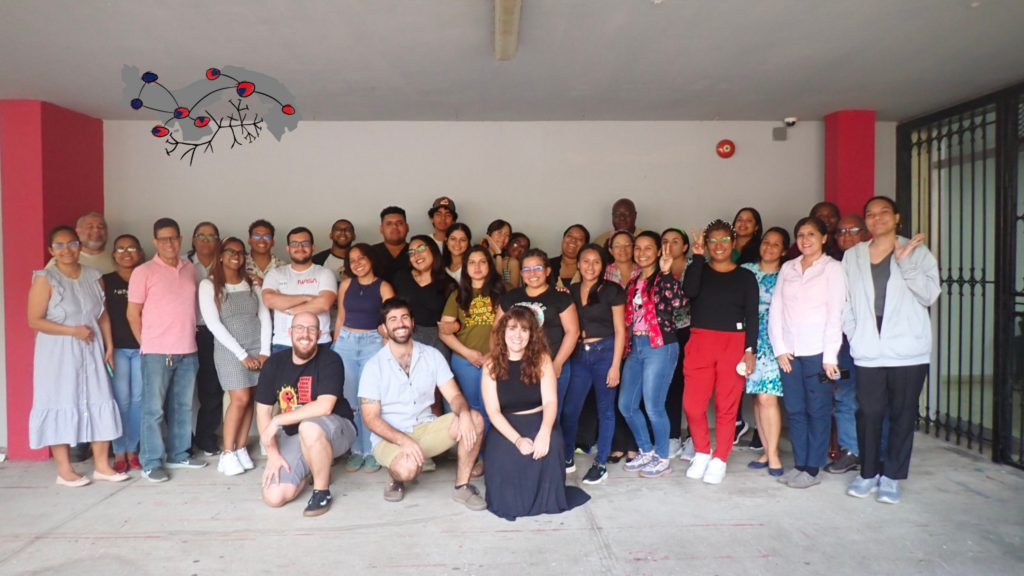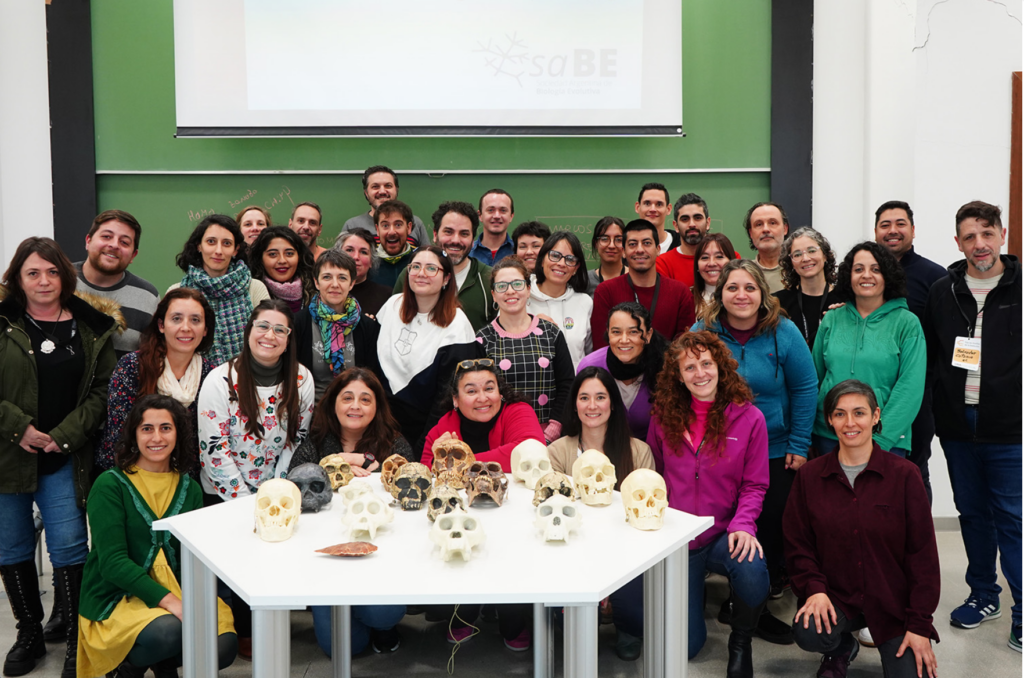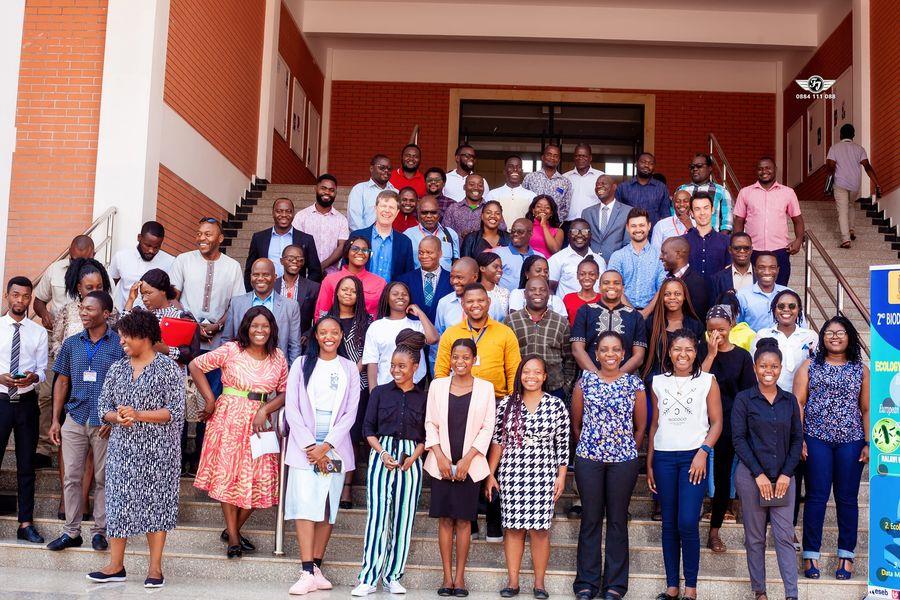2024
II Latin American Meeting of Evolution (Argentina, Guatemala)
Organisers: II CLEVOL Organisers
Summary: to be announced
Evolutionary Biology Workshop of Arachnids in the Western Ghats of India (Kerala, India)
Organiser: Jithin Johnson
Summary: to be announced
Building capacity for molecular systematics and in a global biodiversity hotspot (Madagascar)
Organisers: Arianna Kuhn, Fandresena Rakotoarimalala, Sara Ruane
Summary: to be announced
EvoSur: South American Workshop for Evolutionary
Biology ()
Organisers: Ana María Agapito Vera, Santiago Herrera Álvarez, Cauã Antunes Westmann, Epifanía Arango Isaza & Paco Majic Bergara
Summary: to be announced
Ukrainian School in Evolutionary Biology (Ukraine)
Organisers: Svitlana Serga, Oleksandr Maistrenko,
Natalia Volkova, Taras K. Oleksyk & Walter W. Wolfsberger
Summary: to be announced
2023
The 2022 GEBI call resulted in 26 proposals, from which the GEBI committee selected five events for funding support. These events, conducted in different regions of the globe, involved a total of over 300 participants from over 20 countries, and covered a wide range of activities. Participant and organizer feedback from the activities was highly positive, and indicated the need and importance of such events to foster collaboration and communication about evolution in different parts of the globe. Please see summaries and further details of GEBI-supported events below, consider organizing an event in 2024–2025, and apply for GEBI support in the next call (details here: https://eseb.org/prizes-funding/global-evolutionary-biology-initiative/gebi-call-for-proposals/).

Evolutionary Biology of Panama: Methods and Applications (Panama)
Organisers: Alba Enguídanos García, Carles Galià Camps
Summary: Panama is one of the biggest biological hotspots worldwide. Nevertheless, local fauna is not well studied from a molecular evolutionary point of view, hampering the knowledge of the regional biota. We developed a one-week practical workshop that took place at the University of Panama in which 31 participants from Panama and Colombia from seven institutions, both academic and governmental, were selected. In hands-on sessions, participants learnt marine and terrestrial sampling methods and proper procedures for DNA preservation, obtaining 317 specimens. Some of these samples were used for theoretical-practical sessions of DNA extraction, PCR, electrophoresis, amplicon purification and barcode sequencing. Custom datasets were used to train the participants on sequence curation, alignment, species delimitation, phylogeny, haplotype networks, population genetics statistics and graphical representation with R. Discussions were recurrently settled to establish the concepts and insist on the correct interpretation of the data. Moreover, three keynote speakers were invited to make visible the museum’s importance, as well as the course application in biotechnological and research fields. All samples will be analyzed in the University of Barcelona-IRBio to generate a common-course publication, contributing to promote Panamanian researchers’ CVs. Future bridges are already being explored to transform this course into a regular event. Further information is available here: https://panamabioresearch.com/

First meeting of the Mesoamerican Society for Ecology and Evolution (Guatemala)
Organisers: Sergio González-Mollinedo, Bárbara I. Escobar-Anleu, Julio Ayala-López, Carlos Chúa-Velásquez, Ana Lucía Arévalo-Figueroa, Lourdes Nuñez, María José Chang
Summary: Mesoamerica is a highly biodiverse region, but paradoxically, has extremely low academic development and investment in research. The scientific community here focuses mostly on urgent conservation and management of biodiversity due to the dire situation that ecosystems face. And funding has always been a limitation for local scientists to pursue fundamental research in ecology and evolution. This led us to assemble a team of students and professionals and create the Mesoamerican Society for Ecology and Evolution as a platform from which we seek to build the academic structure needed to explore these fields and build a community that could promote collaboration and the efficient use of funding. The ESEB GEBI fund not only allowed us to consolidate the project, but also allowed us to celebrate the first Mesoamerican Congress of Ecology and Evolution in Guatemala City from August 24th-26th, 2023. A total of 176 participants from 16 countries (most from 6 countries in the region) attended the meeting, which was conducted in hybrid mode. As part of the congress, we also carried out the first assembly of the Society, where we presented its objectives, core principles, and vision. Please refer to our website for details about the team and program of the congress: https://mesoecoevo.github.io

Talking about re-evolution: a pilot project in Cape Verde (Cape Verde)
Organisers: Ana Filipa Moutinho, Ana Teles, João Torres
From October 2 to 9, 2023, we hosted the “Conversations with Darwin” workshop on Biodiversity and Evolutionary Biology in Praia, Cabo Verde. This event was held in collaboration with the University of Cabo Verde, Casa da Ciência da Praia, and Jean Piaget University. The program featured a diverse array of activities, including theoretical seminars, fieldwork in Serra da Malagueta, molecular lab experiments, a bioinformatics practical class, and a demonstration day at Casa da Ciência.
The workshop was a resounding success, with students showing exceptional dynamism and passion. They were particularly enthusiastic about the bioinformatics course, as many had never been exposed to such concepts before. A productive meeting with the deans of the University revealed a keen interest in developing a bioinformatics curriculum.
We remain in close contact with the University and are actively exploring funding opportunities for our long-term project: Bioinformatics Without Borders. This non-profit foundation aims to teach data science and bioinformatics in countries of the global south, building capability in scientific research and education. Additionally, we will have a documentary featuring the activities held at the workshop and student interviews, which will be used to advertise the event and attract more funding to build the non-profit foundation.

Course on evolution (emphasis human evolution) for school teachers (Argentina)
Organisers: Pía Pacheco, Martina Pernigotti
Summary: To address the lack of evolutionary training among Argentinian educators, we collaborated with the Global Evolutionary Biology Initiative to offer a week-long course titled ‘Tras las Huellas de la Evolución: construyendo una mirada crítica de la evolución en el aula’ from July 17–22, 2023. The course focused on evolutionary concepts, with a particular emphasis on human evolution, and was designed for biology and history teachers. Teachers from all over Argentina participated in the program, demonstrating its nationwide impact. Finally, 36 committed participants completed the comprehensive curriculum, which covered topics such as the history of evolutionary thought, teaching strategies, and expanding evolutionary perspectives. A diverse team of researchers and educators led the course, fostering collaboration and innovative lesson design. After the training, the attendees created classroom-ready plans to showcase their new expertise. Course outcomes were presented in a symposium (Teaching Evolution: Proposals, Experiences, and Challenges) at the 5th Argentinian Reunion of Evolutionary Biology (RABE), organised by the Argentine Society for Evolutionary Biology (SABE). Despite the socio-economic challenges in Argentina, we remain hopeful. Our goal is to empower educators and foster science-education partnerships. We appreciate the support of the Global Evolutionary Biology Initiative Committee and the European Society for Evolutionary Biology. We worked together to shape the landscape of evolutionary education, one classroom at a time. More information about the course is given on the event website: https://cursodocentesevolu.wixsite.com/tras-las-huellas-d‑1.

Evolutionary Biology research workshop (Malawi)
Organisers: Wilson Sawasawa, Petros Chigwechokha, Hannes Svardal
Summary: The Malawi University of Science and Technology (MUST), in partnership with the University of Antwerp, Belgium and with the support of the European Society of Evolutionary Biology (ESEB) and the JRS Biodiversity Foundation, organized its 2nd Biodiversity Conference for Malawi 2023 from September 5th to 7th. The conference, held under the theme “Ecology and Evolutionary Biology,” aimed to contribute to both fundamental and applied research for achieving biodiversity conservation, aligned with enabler no. 7 of the Malawi 2063 goals. The conference had several objectives: (1) fostering an interdisciplinary understanding of ecology and biodiversity management, (2) facilitating networking and collaboration among researchers, professionals, and postgraduate students, (3) providing training on formulating research ideas, proposal writing, data management, and analysis, and (4) collectively discussing and compiling funding options for African researchers. Renowned experts in the field served as keynote speakers and facilitators, representing academia and government institutions. The conference attracted a diverse participation of at least 70 individuals, including lecturers, government officials, researchers, and both postgraduate and undergraduate students. This gathering enabled participants to establish valuable contacts and collaborations for future research projects. Media coverage of the event was carried out by various outlets, including Malawi Broadcasting Corporation (MBC), Times Group, and the National Publications Limited.
